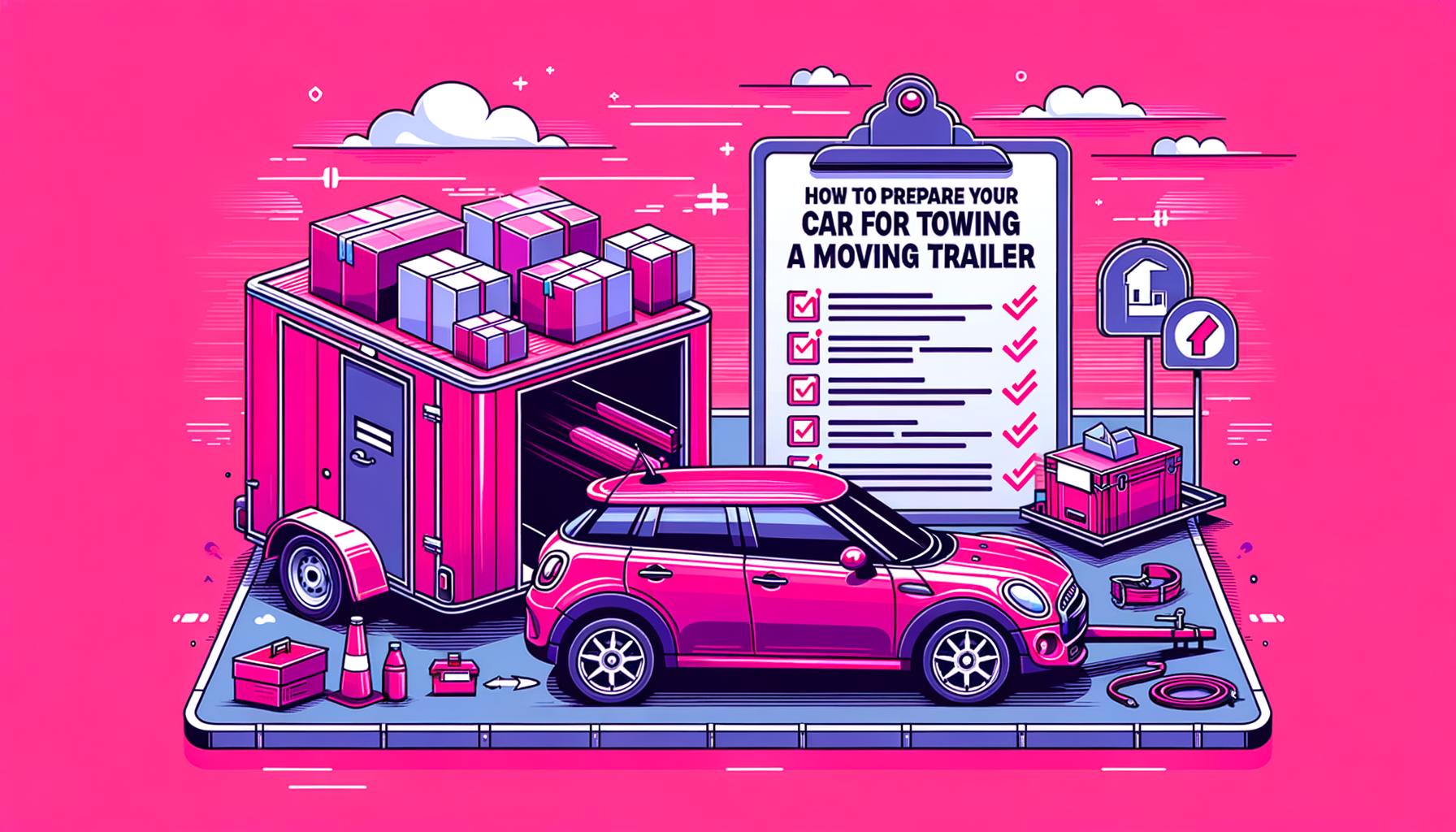 How to Prepare Your Car for Towing a Moving Trailer
How to Prepare Your Car for Towing a Moving Trailer
Towing a trailer can be a daunting task, but with the right preparation, it can also be a safe and successful endeavor. Whether you’re moving to a new home or taking a road trip with a trailer in tow, it’s crucial to ensure that your car is ready for the challenge.
In this article, we’ll cover the essential steps to prepare your car for towing a moving trailer, from understanding the basics of towing, to installing the right equipment and practicing safe towing practices, and to loading and unloading. Let’s dive in!
Understanding the Basics of Towing a Trailer
Before embarking on your towing journey, it’s important to understand the fundamentals of towing and why it’s essential to prepare your car properly. Towing capacity is a crucial consideration to ensure that your car can safely handle the weight of the trailer and its contents. Additionally, different types of trailers come with specific requirements, so understanding these variations is critical to ensure a smooth towing experience.
When it comes to towing a trailer, knowledge is power. The more you understand about the process, the better equipped you’ll be to handle any challenges that may arise. So, let’s dive deeper into the world of towing and explore some key concepts and considerations.
What is Towing Capacity and Why is it Important?
Towing capacity refers to the maximum weight that a vehicle can safely tow. It’s not just a random number; it’s a crucial factor in determining whether your car is capable of safely towing a trailer. Exceeding this limit can put a strain on your car’s engine, transmission, and braking system, compromising both your car’s and the trailer’s safety.
So, how do you find out your car’s towing capacity? The best place to start is by consulting your car’s manufacturer or referring to the owner’s manual. These resources will provide you with accurate and specific information about your car’s towing capabilities. It’s important not to rely on guesswork or assumptions when it comes to towing capacity.
Once you know your car’s towing capacity, it’s crucial to choose a trailer that falls within that limit. Remember, it’s always better to err on the side of caution and choose a trailer that is lighter than your car’s maximum towing capacity. This way, you’ll have a buffer zone and reduce the risk of putting undue stress on your car’s components.
Types of Trailers and Their Specific Requirements
Trailers come in various types, each serving different purposes and having unique characteristics. Understanding the different types of trailers and their specific requirements is vital to ensure a smooth and safe towing experience.
One common type of trailer is the utility trailer. As the name suggests, utility trailers are versatile and can be used for a wide range of purposes. Whether you need to transport landscaping equipment, furniture, or even motorcycles, a utility trailer can come in handy. However, it’s important to note that utility trailers may require additional braking systems or modifications to your car, depending on their weight and size.
Another popular type of trailer is the travel trailer. These trailers are designed for recreational purposes and are often used by campers and outdoor enthusiasts. Travel trailers come in various sizes and configurations, ranging from compact trailers suitable for couples to larger trailers with multiple sleeping areas and amenities. When towing a travel trailer, it’s essential to consider factors like weight distribution, trailer sway control, and proper hitching techniques to ensure a safe and comfortable journey.
Enclosed trailers are another type worth mentioning. These trailers provide protection and security for transporting valuable or delicate cargo. Whether you need to transport a classic car, motorcycles, or even household items during a move, an enclosed trailer can offer peace of mind. However, due to their size and weight, enclosed trailers may require specific towing equipment and considerations, such as reinforced hitches and additional braking systems.
Before towing a particular type of trailer, familiarize yourself with its unique requirements. Read the manufacturer’s guidelines, consult with experts, and consider seeking professional advice if needed. Taking the time to understand the specific requirements of the trailer you plan to tow will ensure a smooth and safe towing experience.
Now that you have a better understanding of towing capacity and the different types of trailers, you’re well-equipped to embark on your towing journey. Remember, safety should always be your top priority. Take the time to prepare your car properly, follow all recommended guidelines, and stay vigilant on the road. Happy towing!
Pre-Towing Car Inspection
Ensuring that your car is in optimal condition before towing is crucial for both your safety and the longevity of your vehicle. Performing a thorough pre-towing car inspection will help you identify any potential issues and address them before hitting the road.
Checking Your Car’s Tires
Your car’s tires play a vital role in maintaining control and stability while towing. Before towing a trailer, inspect the tires for proper tread depth and inflation. Make sure they are in good condition without any signs of wear or damage. Additionally, consider upgrading to tires specifically designed for towing, as they offer enhanced performance and durability.
Inspecting Your Car’s Brakes
Having well-functioning brakes is paramount when towing a trailer. Make sure to inspect your car’s brakes, including the brake pads, rotors, and brake fluid level. Ensure that they are in optimal condition and that the braking system can handle the added weight of the trailer. If necessary, have a professional mechanic perform a thorough brake inspection and make any necessary repairs.
Evaluating Your Car’s Suspension System
The suspension system is responsible for absorbing shocks and maintaining stability while towing. Before towing a trailer, evaluate your car’s suspension system. Check for any signs of sagging, excessive bouncing, or uneven ride height. If you notice any issues, have a professional inspect and potentially upgrade your suspension system to ensure optimal towing performance.
Installing the Right Towing Equipment
Properly equipping your car with the right towing equipment is vital for safe and efficient towing. This includes choosing the right hitch, ensuring proper trailer lights and wiring, and using safety chains.
Choosing the Right Hitch
The hitch is the connection point between your car and the trailer. It’s crucial to select the right type of hitch that matches your car’s towing capacity and the type of trailer you’ll be towing. Consult a professional or refer to your car’s owner’s manual for guidance and consider having the hitch professionally installed to ensure a secure connection.
Importance of Trailer Lights and Wiring
Proper lighting is essential for safe towing. Ensure that your car’s trailer lights and wiring are in good working condition. Test all the lights, including the headlights, taillights, brake lights, and turn signals, before hitting the road. If any lights are malfunctioning, have them repaired or replaced promptly to ensure maximum visibility and safety.
Safety Chains: An Essential Component
Safety chains are a crucial safety feature that connects the trailer to your car in case the hitch fails. Make sure to attach safety chains properly, crossing them under the hitch to prevent the tongue of the trailer from hitting the road in the event of a hitch failure. Additionally, ensure that the safety chains are of appropriate strength for your trailer’s weight.
Preparing Your Trailer for the Move
Once your car is ready for towing, it’s time to prepare the trailer. Properly loading and securing your load is crucial for both the safety and the longevity of your trailer.
Loading Your Trailer Correctly
When loading your trailer, distribute the weight evenly to maintain balance and stability. Place heavier items towards the front, closer to the hitch, and secure them properly to prevent shifting during transit. Refer to the trailer’s specific guidelines for weight distribution to ensure safe towing.
Securing Your Load for Safety
Before hitting the road, make sure that your load is properly secured to prevent any movement or shifting during transit. Use straps, tie-downs, or cargo nets to secure your items, paying careful attention to their stability. Regularly check the security of your load during stops to ensure it remains in place throughout your journey.
On the Road: Safe Towing Practices
Now that your car and trailer are prepared, it’s time to hit the road. Practicing safe towing techniques will further enhance your towing experience and ensure the safety of yourself and others on the road.
Driving Tips When Towing a Trailer
When towing a trailer, it’s essential to adjust your driving habits to accommodate the added weight and altered driving dynamics. Maintain a safe and steady speed, keeping a larger following distance to allow for increased stopping distance. Take turns and corners wider to prevent the trailer from swinging out, and avoid sudden braking or acceleration. Familiarize yourself with your car’s blind spots and use your mirrors frequently to monitor the position of the trailer.
Understanding the Impact of Weather on Towing
Weather conditions can greatly affect your towing experience. Rain, high winds, and icy roads can pose significant challenges when towing. It’s essential to stay informed about the weather conditions along your route and adjust your driving accordingly. Slow down, exercise caution, and consider postponing your journey if the conditions are unsafe.
By following these crucial steps and practicing safe towing practices, you’ll be well-prepared to tow a moving trailer. Remember, proper preparation is key to ensuring a smooth and successful towing experience. So, take the time to understand the basics, inspect your car, install the right towing equipment, prepare your trailer, and practice safe driving techniques. Happy towing!





